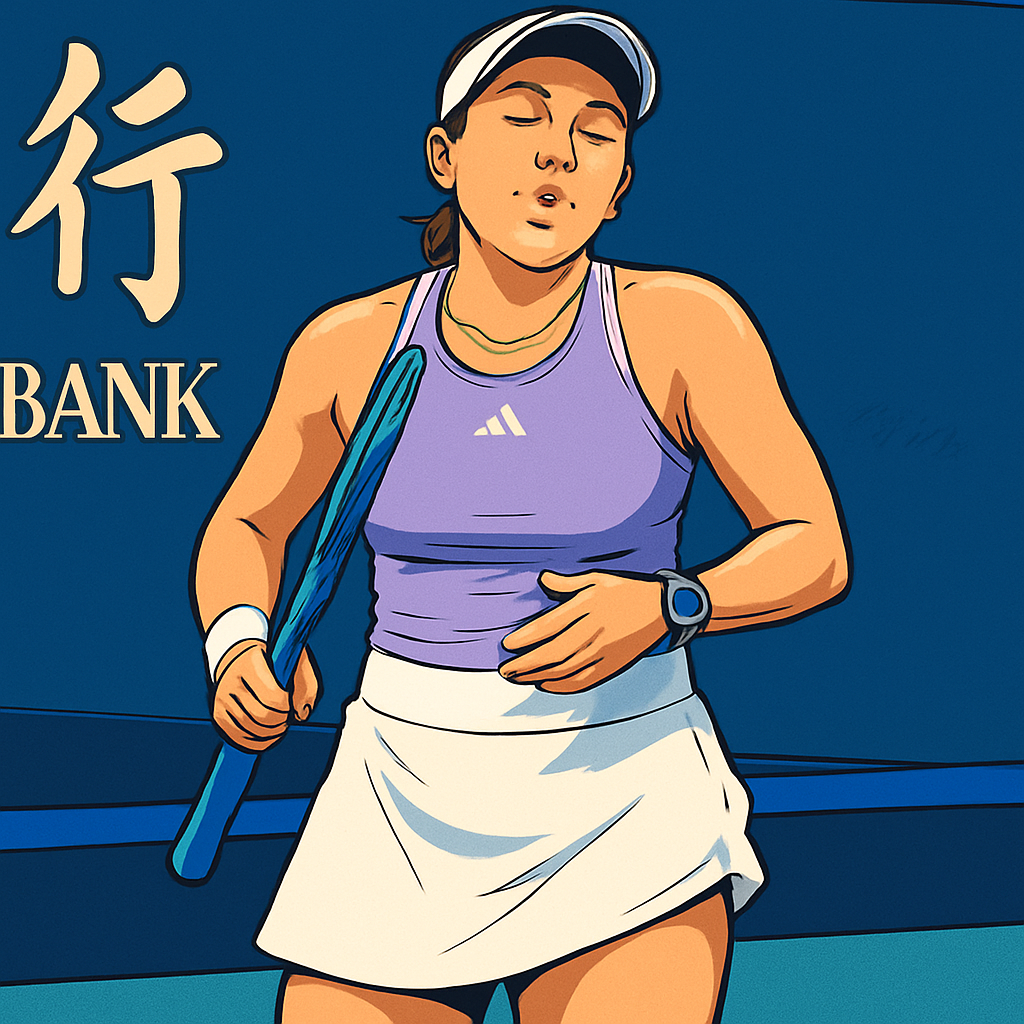BEIJING — Just days after staging a stunning comeback to save multiple match points against Emma Raducanu, Jessica Pegula’s hopes of a deep run at the China Open ended in heartbreak as she squandered match points of her own, falling 6-4, 6-7(2), 7-6(1) to Latvia’s Jelena Ostapenko in a grueling semi-final clash on Saturday.
The match, a rollercoaster lasting two hours and 56 minutes, saw the American world No. 5 fail to convert two match points on Ostapenko’s serve at 5-4 in the deciding set. The loss was a cruel reversal of fortune for Pegula, who had famously saved four match points against Britain’s Raducanu in a dramatic second-round victory that seemed to signal her resilience and championship mettle.
A Tale of Two Tiebreaks
The contrast between the two tiebreaks in the final set told the entire story of the match. Pegula, typically one of the most consistent and mentally tough players on tour, seemed in control as she maneuvered a break ahead in the third set. Serving for the match at 5-4, she earned her first match point, but Ostapenko, the 2017 French Open champion, saved it with a characteristically aggressive forehand winner.
A second match point followed, only to be erased by another unreturned Ostapenko forehand. From that moment, the momentum shifted irrevocably. Pegula was broken in that game, and Ostapenko held firm to force a final-set tiebreak. There, the Latvian’s power and fearless hitting overwhelmed Pegula, who won just a single point in the decisive breaker. "I had my chances and I didn't take them," a dejected Pegula said in her post-match press conference.
The Ghost of the Raducanu Match
The semi-final defeat was made all the more painful by the memory of her escape act against Emma Raducanu earlier in the week. In that match, Pegula was on the brink of defeat, staring down four match points in the second set before mounting an incredible fightback to win 4-6, 7-6(9), 6-1. The victory was hailed as a testament to her never-say-die attitude.
Key factors in her comeback against Raducanu included:
- Relentless returning under extreme pressure
- Capitalizing on a slight dip in Raducanu's first-serve percentage
- Imposing her baseline game in the decisive third set
Against Ostapenko, however, the roles were reversed. It was Pegula who held the advantage and Ostapenko who played the fearless, nothing-to-lose tennis in the critical moments. The Latvian’s high-risk, high-reward style ultimately paid dividends when it mattered most.
Ostapenko's Power Proves Decisive
Jelena Ostapenko’s game plan was clear from the outset: attack, attack, and attack some more. She finished the match with a staggering 42 winners, but also 41 unforced errors, a statistic that perfectly encapsulates her go-for-broke philosophy. Pegula, by contrast, hit a more conservative 19 winners to 18 unforced errors, but was unable to consistently blunt her opponent's power.
Ostapenko was particularly effective in targeting Pegula’s second serve, winning 60% of those points. Her returns were often punishing, not allowing Pegula to settle into a rhythm from the baseline. After the match, Ostapenko acknowledged the difficulty of the battle, stating, "It was a very tough match. We both fought until the very last point. I knew I had to be aggressive and take my chances."
A Pattern of Close Calls for Pegula
For Jessica Pegula, the loss continues a frustrating pattern of near-misses in the latter stages of big tournaments. Despite being a permanent fixture in the world's top 5 and a quarter-finalist at multiple Grand Slams, she has yet to breakthrough to a major final. This semi-final in Beijing, a WTA 1000 event, represented another prime opportunity to claim a signature title.
Her record in semi-finals and finals has become a talking point, with this latest defeat marking her third loss in a WTA 1000 semi-final this season alone. While her consistency is undeniable, converting these crucial moments remains the final hurdle in her quest to join the elite tier of multiple major champions.
Looking Ahead to the WTA Finals
The immediate aftermath of the loss is bittersweet for Pegula. While the defeat in Beijing stings, her strong performance throughout the Asian swing has solidified her qualification for the season-ending WTA Finals in Cancún. She will be one of the eight elite players competing for the prestigious title, and the experience in Beijing, both the high of the Raducanu win and the low of the Ostapenko loss, will provide valuable lessons.
The key takeaways for Pegula heading into the finals will likely focus on:
- Closing out matches when opportunities arise
- Adapting tactics when facing ultra-aggressive opponents
- Managing emotional energy after draining victories
For Ostapenko, the victory marks a significant return to form, propelling her into the biggest final of her season where she will face either Iga Swiatek or Coco Gauff. It is a reminder that on her day, her explosive power can dismantle any player on tour.
Conclusion: A Lesson in Capitalizing
In the end, the China Open semi-final was a brutal lesson in the fine margins of professional tennis. Jessica Pegula’s agony was a direct result of her inability to convert her match points, a stark contrast to her own escape just days prior. The match underscored a fundamental truth of the sport: momentum is fleeting, and failing to seize a critical moment can change the entire complexion of a match. "It's a tough one to lose," Pegula summarized, a sentiment that barely scratches the surface of the disappointment.
As the tour moves toward its climax in Cancún, Pegula will be left to reflect on what might have been in Beijing. The victory over Raducanu proved she has the heart of a champion, but the loss to Ostapenko highlighted the ruthless efficiency required to ultimately claim the biggest trophies. Her China Open journey was a tale of two matches, defined by match points saved and match points squandered.

